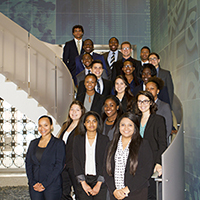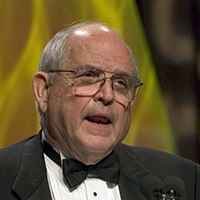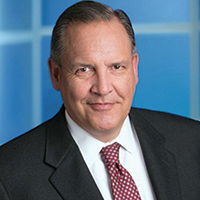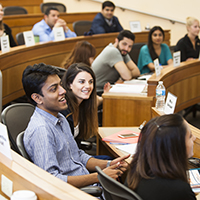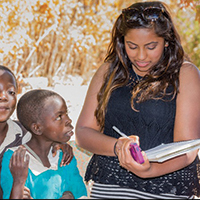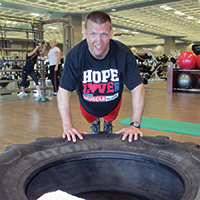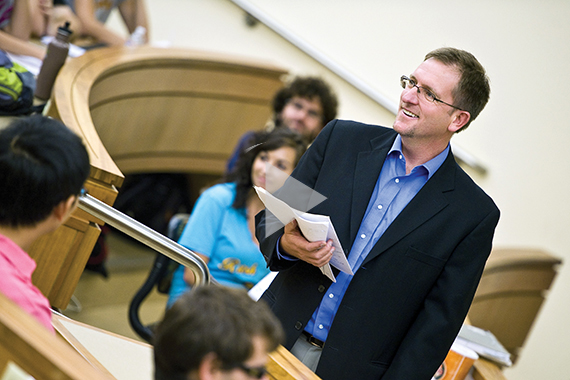 David Hummels, an award-winning professor of economics and a frequent consultant to the U.S. government and international agencies, joined Krannert in 2000 after serving on the faculty at the University of Chicago Booth School of Business. To view the complete interview, click on the image above. (Photo by Andrew Hancock)
David Hummels, an award-winning professor of economics and a frequent consultant to the U.S. government and international agencies, joined Krannert in 2000 after serving on the faculty at the University of Chicago Booth School of Business. To view the complete interview, click on the image above. (Photo by Andrew Hancock)Ahead of the Curve
David Hummels takes the lead as school's new dean
When David Hummels was officially named dean of the Krannert School in May after serving in an interim capacity for the previous nine months, it would have been tempting to say that he “hit the ground running” in his new role. But it would be more accurate to say that he “hit the ground pedaling.”
An avid cyclist who rides for both fitness and transportation, Hummels bikes to work whenever weather and schedules permit. As an economics professor, a research associate for the National Bureau of Economic Research, and now as dean, he also uses that time to think about his current priorities, whether administrative or academic.
“If I am trying to solve a problem, understand an issue or make an important decision, I make a point of reading something related to it before I jump on the bike,” Hummels says. “Then my brain sort of involuntarily grinds away while I’m riding.”
Krannert Magazine caught up with Hummels this fall to ask about his path to Purdue and what’s been on his mind in his new role as dean.
Krannert Magazine: How did you get started in academia?
David Hummels: I spent my childhood asking the question, ‘Why?’ and never really being satisfied with the answers I got. When I learned that you could make a career out of it, I decided to go that direction.
KM: You grew up in Colorado. How did you go from there to Purdue?
DH: I started off in engineering at Colorado. The work was fine, but it didn’t really resonate with me in terms of what I wanted to spend my life doing. So I switched over to economics at the suggestion of my father. I did graduate school at the University of Michigan. I spent five years on the faculty at the Booth School of Business at the University of Chicago and then came here to Purdue as an assistant professor. I’ve been here ever since.
KM: What’s the best part of being a college professor?
DH: First, I love being in front of a classroom, taking an idea, turning it inside out, and then seeing complicated notions suddenly make sense to the students. In my research-faculty life, there’s a tremendous intellectual freedom to explore strange and unusual ideas, to go down paths nobody else has trod, and then to look over your shoulder and find that a bunch of people have followed you in thinking that was a pretty good thing to work on.
KM: You had not been an administrator before taking on the role of dean. Why did you decide to make that leap?
DH: In my faculty-research life, one of the things I specialize in is taking pieces of a puzzle — people with different skill sets, methodologies or ideas from different areas — and combining them in novel ways. For that to work, you really need high-quality assets to combine. Krannert has a tremendous set of assets. Purdue has a tremendous set of assets that can be recombined in extraordinary ways. As dean, you have the capability and the opportunity to pull together those assets to create something better than what we had before.
KM: Have you been surprised by the complexity of the job?
DH: I have. Initially, I thought having been on the faculty for 15 years, I would have a good sense of the scope of the operations here. But you don’t fully appreciate it until you step into the dean’s office and you see all the great things that are happening. The other part that is pretty exciting is when you have a hundred-plus faculty and a hundred-plus staff and thousands of students, there are a lot of big brains full of great ideas just waiting to be unleashed. That can make for an occasionally chaotic but tremendously creative brew … a kind of complexity that sometimes can be challenging to work with and manage, but you get extraordinary outcomes.

